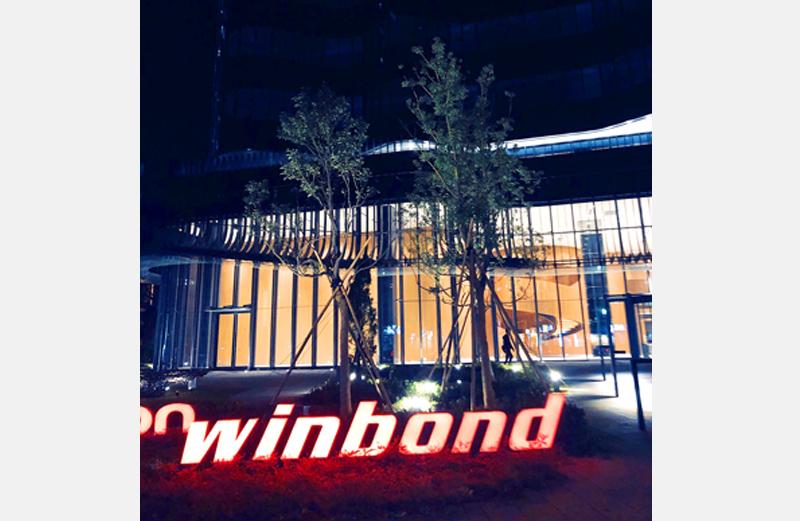Memory chipmaker Winbond Electronics Corp (華邦電子) expects ongoing memory chip supply constraints to extend into next year mainly due to scant supply, providing further upsides for chip prices, company president James Chen (陳沛銘) said yesterday.
“Overall, this year’s momentum will carry into next year,” Chen told a teleconference yesterday. “The supply of specialty DRAM will continue to be tight next year.”
“Based on what we know, the world’s top three memorychip makers do not plan to add new capacity for specialty DRAM next year,” he said.

Photo: Grace Hung, Taipei Times
Demand for DRAM and flash memory chips remains robust, driven by the acceleration of 5G infrastructure deployment worldwide, the upgrading of wireless technology to Wi-Fi 5 or Wi-Fi 6, as well as rising demand for wearable devices and true wireless stereo earbuds, but chipmakers are unable to match the demand due to capacity tightness, Winbond said.
The company is expected to crank out a small volume of specialty DRAM by the end of next year, when its new fab in Kaohsiung enters initial production as scheduled, Chen said.
The Kaohsiung fab is to have an installed capacity of 10,000 12-inch wafers per month in the first phase of the company’s expansion plans, he said.
The company plans to make specialty DRAM chips using advanced 20-nanometer technology, which can boost output by more than 30 to 40 percent over the 25-nanometer technology that it currently uses.
Specialty DRAM is one of Winbond’s major revenue contributors, accounting for about 46 percent of total memory chip revenue last quarter, while NOR and NAND flash memory chips made up the remaining 54 percent.
As demand for all of Winbond’s products continues to outpace its supply, the company expects more price increases this quarter, which would likely raise its gross margin up from 42 percent last quarter, Chen said.
“More customers want to negotiate longer-term supply agreements. We are discussing with some customers the possibility of signing one-year contracts next year,” he said.
The company’s board of directors yesterday approved a new capital budget of NT$2.79 billion (US$100.43 million) for the Kaohsiung fab. It plans to invest NT$11.8 billion in new facilities and equipment this year, up from 7.9 billion last year.
Winbond’s net profit for the second quarter more than doubled to NT$3.78 billion, up from NT$1.71 billion in the first quarter — a company record.
In the first half of the year, net profit rose to NT$5.49 billion, up from NT$757 million in the same period last year. Earnings per share increased to NT$1.24 from NT$0.16.
Revenue increased about 92 percent to NT$46.56 billion in the first half, mostly due to price hikes. Winbond saw shipments little changed, as the factory utilization rate neared its maximum.

In Italy’s storied gold-making hubs, jewelers are reworking their designs to trim gold content as they race to blunt the effect of record prices and appeal to shoppers watching their budgets. Gold prices hit a record high on Thursday, surging near US$5,600 an ounce, more than double a year ago as geopolitical concerns and jitters over trade pushed investors toward the safe-haven asset. The rally is putting undue pressure on small artisans as they face mounting demands from customers, including international brands, to produce cheaper items, from signature pieces to wedding rings, according to interviews with four independent jewelers in Italy’s main

Japanese Prime Minister Sanae Takaichi has talked up the benefits of a weaker yen in a campaign speech, adopting a tone at odds with her finance ministry, which has refused to rule out any options to counter excessive foreign exchange volatility. Takaichi later softened her stance, saying she did not have a preference for the yen’s direction. “People say the weak yen is bad right now, but for export industries, it’s a major opportunity,” Takaichi said on Saturday at a rally for Liberal Democratic Party candidate Daishiro Yamagiwa in Kanagawa Prefecture ahead of a snap election on Sunday. “Whether it’s selling food or

CONCERNS: Tech companies investing in AI businesses that purchase their products have raised questions among investors that they are artificially propping up demand Nvidia Corp chief executive officer Jensen Huang (黃仁勳) on Saturday said that the company would be participating in OpenAI’s latest funding round, describing it as potentially “the largest investment we’ve ever made.” “We will invest a great deal of money,” Huang told reporters while visiting Taipei. “I believe in OpenAI. The work that they do is incredible. They’re one of the most consequential companies of our time.” Huang did not say exactly how much Nvidia might contribute, but described the investment as “huge.” “Let Sam announce how much he’s going to raise — it’s for him to decide,” Huang said, referring to OpenAI

The global server market is expected to grow 12.8 percent annually this year, with artificial intelligence (AI) servers projected to account for 16.5 percent, driven by continued investment in AI infrastructure by major cloud service providers (CSPs), market researcher TrendForce Corp (集邦科技) said yesterday. Global AI server shipments this year are expected to increase 28 percent year-on-year to more than 2.7 million units, driven by sustained demand from CSPs and government sovereign cloud projects, TrendForce analyst Frank Kung (龔明德) told the Taipei Times. Demand for GPU-based AI servers, including Nvidia Corp’s GB and Vera Rubin rack systems, is expected to remain high,